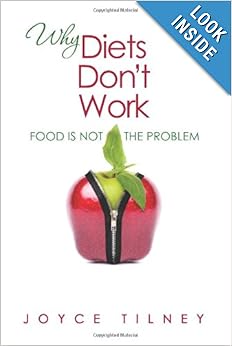
Why Diets Don’t Work:
Food is Not the Problem by Joyce Tilney
In the ever burgeoning culture we live in, food runs across
our palate at a feverish pace. From
commercials to convenience stores, we are enticed to join the wagon of
high-calorie fat laden foods. We need a healthy
dose of wisdom of about our bodies and the way eating and food interact with
each other. This new book, Why Diets Don’t Work by Joyce Tilney is
a work that focuses on the issues surrounding the battle of the mind, our
desires, and our habits surrounding food rather than crash diets. The benefit
of the book is its tendency to take every thought captive through the Word of
God and reframe our thinking regarding food, dieting, and image.
Joyce begins the book by harnessing her efforts toward
understanding her book as a battle plan.
She writes, “To overcome any battle in life, we must understand ourselves
and how we are created to function in this world as children of God.” (xv) The question that Joyce tries to answer is, “How
can we be obedient to God with our bodies, including our food choices?” Recognizing this point, Joyce points out the
Devil’s work in distracting us from being obedient. She writes, “Again, the devil’s tool is
distraction, to get us so focused on the things of the world that we lose focus
on our relationship with the Lord.” (9)
This is part of the deceptive schemes of the devil to speak lies to us
so that we will have greater affections for the people and things that move us
away from godliness. Alongside the devil’s
lies, we also have to understand that every day we make choices that affect our
bodies, for fuel or fat (15). The
temptation to bring unhealthy foods into our bodies lessens as we make good choices
on a continual basis that provide fuel and energy for the long haul.
The chapter on fasting was always one worth mentioning. Joyce says, “A fast is always to draw us into
a deeper relationship with God.” (52)
Fasting dulls our desire to think of food only as a comfort or to absorb
the pain we face during our lives.
Rather, fasting puts into the right alignment our relationship with God
and others. There is fasting in my own
strength and fasting trusting in the Almighty God, one will call us to greater obedience
but one will not work in the long
run. Fasting is certainly a way of
dedicating the time we would spend eating with a fervent fellowship with our
King.
There were some troubling things in the book that I want to mention
also. At times, you get the hint that to
desire a piece of coconut cream pie is a sin, or to have a craving about a food
item is inherently wrong. Maybe in
disproportionate amounts or too frequently is unhealthy but desiring a piece of
pie, I’m not sure how this is wrong in itself.
Secondly, the whole thing about hearing His voice, receiving a
revelation can be very unhelpful because it seems to take the place of
Scripture at times. If we are going to
hear God’s voice, we have his Words in Scripture to live by, we need the Spirit’s
guidance but talking about time and again about a secret voice is not helpful.
Thanks to The Voice of Grace and Truth and Book Crash for
the copy of this book in exchange for review.
Comments
Post a Comment